
-
ผลิตภัณฑ์แนะนำ
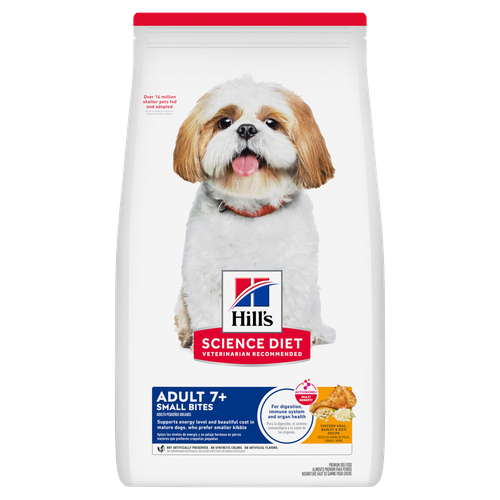 Hill's® Science Diet® Adult 7+ Small Bites Chicken Meal, Barley & Rice Recipe dog food
Hill's® Science Diet® Adult 7+ Small Bites Chicken Meal, Barley & Rice Recipe dog foodให้พลังงาน เสริมสุขภาพเส้นขนและผิวหน้ง สำหรับสุนัขที่ชอบเม็ดขนาดเล็ก
ช้อปเลยตอนนี้ Hill's® Science Diet® Adult Small Bites Chicken & Barley Recipe dog food
Hill's® Science Diet® Adult Small Bites Chicken & Barley Recipe dog foodเสริมสร้างมวลกล้ามเนื้อ สำหรับสุนัขที่ชอบขนาดเม็ดเล็ก
ช้อปเลยตอนนี้ Adult Small & Mini Chicken & Brown Rice Recipe Dog Food
Adult Small & Mini Chicken & Brown Rice Recipe Dog Foodสำหรับสุนัขสายพันธุ์เล็กและมินิ ที่มีระบบการเผาผลาญพลังงานสูง
ช้อปเลยตอนนี้ความต้องการด้านสุขภาพผลิตภัณฑ์ที่เกี่ยวข้อง Adult 7+ Indoor Chicken Recipe
Adult 7+ Indoor Chicken Recipeให้พลังงานที่เหมาะสม , และช่วยให้ผิวหนังและขนสวยสุขภาพดี สำหรับแมวสูงวัย เลี้ยงในบ้าน
ช้อปเลยตอนนี้ Kitten Chicken Recipe Cat Food
Kitten Chicken Recipe Cat Foodเสริมสร้าง 5 พื้นฐานสำคัญในขวบปีแรก
ช้อปเลยตอนนี้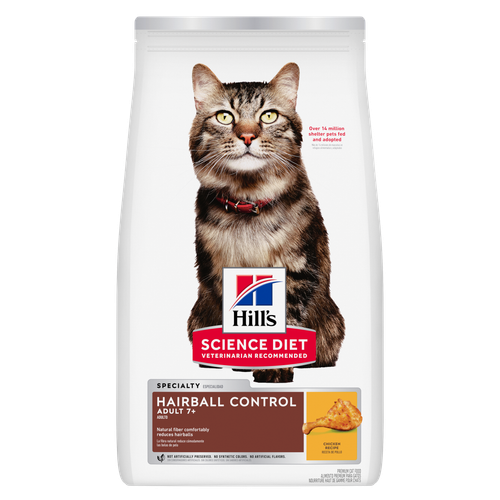 Adult 7+ Hairball Control Chicken Recipe Cat Food
Adult 7+ Hairball Control Chicken Recipe Cat Foodไฟเบอร์ธรรมชาติ ช่วยลดการเกิดก้อนขน
ช้อปเลยตอนนี้ -
สุนัข
- เคล็ดลับและบทความเกี่ยวกับสุนัข
-
การดูแลสุขภาพสุนัข
- น้ำหนัก
- ภูมิแพ้อาหารและสิ่งแวดล้อม
- ทางเดินปัสสาวะ
- ทางเดินอาหาร
- ข้อต่อ
- ไต
-
ช่วงอายุของสุนัข
- โภชนาการสำหรับสุนัขโต
แมว- เคล็ดลับและบทความเกี่ยวกับแมว
-
การดูแลสุขภาพแมว
- น้ำหนัก
- ภูมิแพ้อาหารและสิ่งแวดล้อม
- ทางเดินปัสสาวะ
- ทางเดินอาหาร
- ไต
-
ช่วงอายุของสุนัข
- โภชนาการสำหรับแมวโต
- โภชนาการสำหรับแมวสูงวัย
บทความแนะนำ เคล็ดลับการเก็บรักษาอาหารสัตว์เลี้ยง
เคล็ดลับการเก็บรักษาอาหารสัตว์เลี้ยงที่ที่คุณเก็บอาหารสุนัขหรือแมวของคุณจะสร้างความแตกต่างอย่างใหญ่หลวงให้กับคุณภาพและความสดใหม่ของอาหาร เมื่อมีการเปิดอาหารออกมา คำถามและคำแนะนำทั่วไปบางอย่าง สำหรับการเก็บรักษาอาหารสุนัขหรือแมวแบบกระป๋องและแบบแห้งของฮิลส์ให้เหมาะสม
อ่านเพิ่มเติม Antioxidants: Fueling your cats fight against free radicals
Antioxidants: Fueling your cats fight against free radicalsLearn more about free radicals and how antioxidants help provide some protection against free radicals and how Hills pet foods makes a difference.
อ่านเพิ่มเติม เบื้องหลังวิทยาศาสตร์อันน่าทึ่งของไมโครไบโอมในสัตว์เลี้ยง
เบื้องหลังวิทยาศาสตร์อันน่าทึ่งของไมโครไบโอมในสัตว์เลี้ยงเบื้องหลังวิทยาศาสตร์อันน่าทึ่งของไมโครไบโอมในสัตว์เลี้ยง
อ่านเพิ่มเติม -


You probably already know that proteins are important for your own good health, and your cat needs them, too. The right combination of proteins is essential, but your cat needs help achieving the correct mix. Choosing the right cat food can make ensure your pet gets a sufficient boost of protein power.
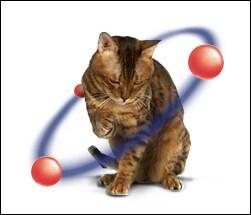 Proteins at work.
Proteins at work.
What they do. Proteins are the building blocks of body organs and tissues, everything from cartilage and tendons to hair, skin and blood. They can also function as enzymes, hormones and antibodies. It's important to remember that more protein doesn't necessarily mean better health. Protein is a powerful part of good nutrition, but no more powerful than other essential nutrients also requires for optimal health.
How they are used. Your cat's body absorbs amino acids — the key components of proteins — from food and puts them to use by creating new proteins or fueling other bodily processes. This "synthesis" can be limited when certain amino acids are not present in the cat's body or not available in the right amounts. That's why food is so crucial in maintaining proper levels.
The taurine factor. Taurine is a required component of proteins in cats and deficiency can contribute to a variety of serious health problems. Maintaining healthy levels is a particular challenge because cats have a limited ability to create taurine as needed and taurine is easily lost in digestive waste.


เคล็ดลับความอร่อย
ลูกแมวอาจต้องพาไปฉีดวัคซีนหลายครั้งในปีแรก โดยทั่วไปแมวโตจะได้รับประโยชน์จากการตรวจสุขภาพประจำปี ในขณะที่แมวสูงอายุหรือแมวที่มีความต้องการพิเศษอาจต้องพาไปตรวจบ่อยกว่านั้น
Your cat's special needs.
Cats retain many of the same traits and nutritional needs of lions, tigers and other members of their extended family. Therefore, cats have a higher protein requirement than most other domestic animals. Healthy protein levels are especially important for growing kittens and adult cats that are nursing.
More protein than dog's need. Cats require significantly more protein than omnivores, such as dogs. That's because cats use protein for energy when possible and need more of certain amino acids to create building blocks and fuel bodily processes.
Carnivore cravings. Unlike an omnivore, a cat's body is specifically made for consuming more protein than carbohydrates — a trademark of a carnivore. Certain digestive track enzymes that are common in omnivores, for example, are absent in cats.
Balancing amino acids from animals and plants. Although cats, as carnivores, must obtain certain essential amino acids from animal protein sources, the rest are readily available from plant proteins. The proper mix of high-quality animal and plant protein sources provides the right combination of essential amino acids for your cat.
The right food for your cat should strike a precise, healthy balance of all essential amino acids and proteins in addition to other nutrition that helps achieve and maintain overall wellness. Talk to your veterinarian about your specific cat's special needs to ensure optimal nutrition.


ผู้เขียนของเราท่านหนึ่งได้เตรียมบทความนี้ไว้สำหรับคุณ
ผลิตภัณฑ์ที่เกี่ยวข้อง

ให้พลังงานที่เหมาะสม , และช่วยให้ผิวหนังและขนสวยสุขภาพดี สำหรับแมวสูงวัย เลี้ยงในบ้าน

เสริมสร้าง 5 พื้นฐานสำคัญในขวบปีแรก
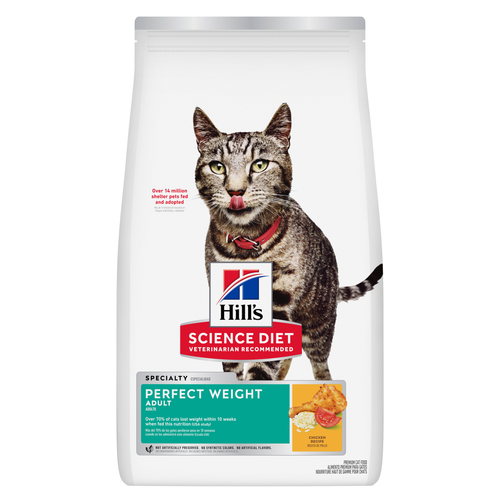
กว่า 70% ของแมว ลดน้ำหนักเห็นผลและปลอดภัยภายใน 10 สัปดาห์

ไฟเบอร์ธรรมชาติ ช่วยลดการเกิดก้อนขน
บทความที่เกี่ยวข้อง

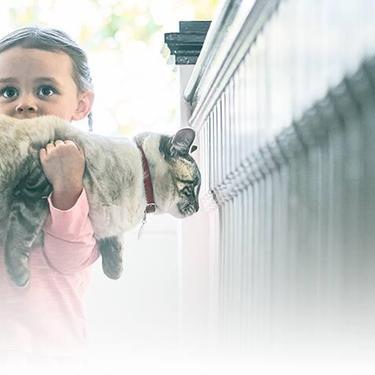
แมวที่มีผิวแพ้ง่ายจะมีความต้องการพิเศษ และแม้แต่แมวสุขภาพดี ในบางครั้งก็อาจมีปัญหาสุขภาพผิวหนังได้ เรียนรู้เพิ่มเติมเกี่ยวกับอาการผิวแพ้ง่ายในแมวของคุณ สิ่งที่คุณสามารถทำเพื่อช่วยให้สัตว์เลี้ยงของคุณสบายตัวขึ้นได้ และการรับคำแนะนำเกี่ยวกับอาหารสำหรับแมวที่มีผิวแพ้ง่าย
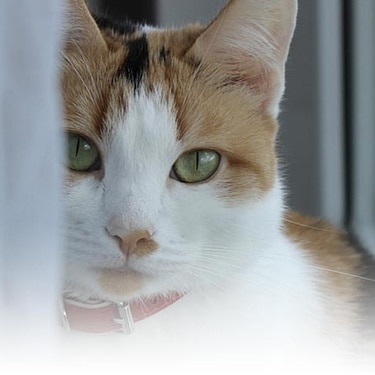
When you adopt a cat, you don't just gain a best friend; you also save her life. Here's why getting a cat from a local animal shelter makes so much sense.

ค้นหาอาหารที่เหมาะสมสำหรับแมวเลี้ยงในบ้านจากฮิลส์ ไซเอนซ์ ไดเอท ที่คิดค้นสูตรมาสำหรับแมวเลี้ยงในบ้านของคุณโดยเฉพาะ แมวเลี้ยงในบ้านมีความต้องการด้านอาหารการกินเป็นพิเศษ ซึ่งอาหารแมวจากฮิลส์ ไซเอนซ์ ไดเอท ตอบโจทย์ความต้องการของเจ้าเหมียวได้อย่างลงตัว

ให้แมวของคุณกินอาหารโดยไม่ให้พวกมันรู้
สูตรแคลอรี่ต่ำของเราช่วยให้คุณควบคุมน้ำหนักของแมวได้ อุดมไปด้วยโปรตีนคุณภาพสูงสำหรับสร้างกล้ามเนื้อ และผลิตจากส่วนผสมที่มีจุดประสงค์เฉพาะเพื่อมื้ออาหารที่อร่อยและมีคุณค่าทางโภชนาการ สารต้านอนุมูลอิสระที่ได้รับการพิสูจน์ทางคลินิกแล้วอย่างวิตามินซีและอี ช่วยส่งเสริมระบบภูมิคุ้มกันให้แข็งแรง
ให้แมวของคุณกินอาหารโดยไม่ให้พวกมันรู้
สูตรแคลอรี่ต่ำของเราช่วยให้คุณควบคุมน้ำหนักของแมวได้ อุดมไปด้วยโปรตีนคุณภาพสูงสำหรับสร้างกล้ามเนื้อ และผลิตจากส่วนผสมที่มีจุดประสงค์เฉพาะเพื่อมื้ออาหารที่อร่อยและมีคุณค่าทางโภชนาการ สารต้านอนุมูลอิสระที่ได้รับการพิสูจน์ทางคลินิกแล้วอย่างวิตามินซีและอี ช่วยส่งเสริมระบบภูมิคุ้มกันให้แข็งแรง

